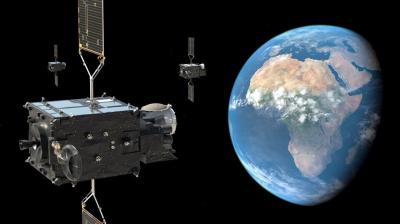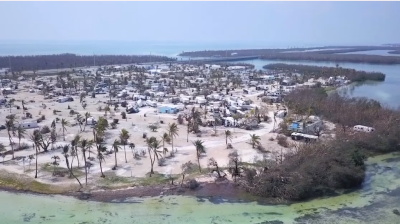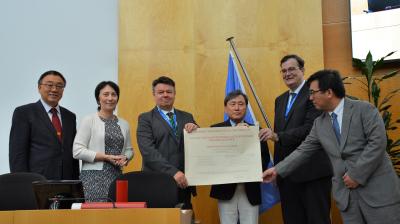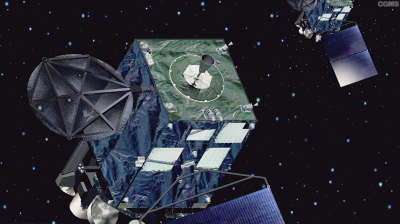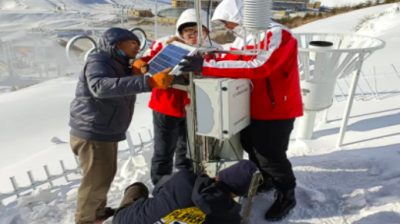WMO: protect radio frequencies vital to earth observations
The governing congress of the World Meteorological Organization has stressed the need to protect radio frequencies allocated to services supporting earth observations. Jeopardizing these frequencies jeopardizes weather forecasts and warning services and, thus, people’s lives.

The governing congress of the World Meteorological Organization has stressed the need to protect radio frequencies allocated to services supporting earth observations. Jeopardizing these frequencies jeopardizes weather forecasts and warning services and, thus, people’s lives.
The World Meteorological Congress passed a resolution expressing its “serious concern at the continuing threat to several radio-frequency bands allocated to the meteorological aids, meteorological-satellite, Earth exploration satellite and radiolocation (weather and wind profiler radars) services posed by the development of other radiocommunication services.”
The World Meteorological Congress meets every 4 years and is the top decision-making body of WMO. Its resolution reflects the alarm felt within the worldwide Earth observations and meteorological community at the increasing competition for bandwidths.
Weather forecasting and hazard warning services operated by WMO Members are vital to protect lives and property from natural hazards such as tropical cyclones. Thanks to timely warnings, there has been a big reduction in the loss of life during recent decades.
These improvements are directly related to the use of radio frequency based remote sensing feeding directly into numerical weather prediction systems giving more accurate predictions with longer lead periods.
But, there is increasing pressure on the use of radio spectrum from wireless technology and other applications, including International Mobile Telecommunications (IMT) services that include new technologies such as 5G.
Congress noted although it does not oppose the frequencies being proposed for new technologies such as 5G, failure to manage unwanted emissions from these new telecommunication technologies would have a significant impact on the remote sensing. Consequently, this might reverse many of the gains in our warning services for natural hazards and thus potentially lead to increases in loss of life and property.
The primary concern is the 23.6-24 GHz “passive” satellite observation frequency band which is adjacent to the 5G 24.25-27.5 GHz band under discussion. Current ITU-R studies in all frequency bands show that only an important reduction of IMT-2020 unwanted emissions can ensure protection of EESS (passive) sensors, in particular for the 23.6-24 GHz “passive” band.
The Congress resolution appeals to the International Telecommunication Union and its Member Administrations:
- To ensure the availability and absolute protection of the radio-frequency bands which, due to their special physical characteristics, are a unique natural resource for spaceborne passive sensing of the atmosphere and the Earth’s surface and are of crucial importance for weather, water and climate research and operations;
- To give due consideration to the WMO requirements for radio-frequency allocations and regulatory provisions for meteorological and related environmental operations and research;
WMO and the International Telecommunications Union (ITU) have worked closely over many years to protect these special radio frequencies through ITUs Radio Regulations but it is up to the Members of these organizations to take note of the scientific studies and ensure that appropriate protection is maintained and is sustainable.
The Congress resolution stresses:
- The prime importance of the specific radiocommunication services for meteorological and related environmental activities required for the detection and early warning of hazards and the prevention and mitigation of natural and technological (human-induced) disasters, the safety of life and property, the protection of the environment, climate change studies and scientific research,
- The importance of information provided by the Earth exploration systems including meteorological systems for a wide range of economic activities such as agriculture, transportation, construction and tourism,
- The crucial importance of the allocation of suitable radio-frequency bands for the operation of surface-based meteorological observing systems, including in particular radiosondes, weather radars, radiometer and wind profiler radars,
- The crucial importance of the allocation of suitable radio-frequency bands for the operation of meteorological and research and development satellites, including remote-sensing, data collection and data distribution links,
- implications of losing critical radio frequencies reserved to Meteorology on services provided by Members in support of the above economic activities as well as protection of life and property, and potential erosion of such services;
- the impact of implementation of future commercial technology transmissions (for example in the 24 GHz band used by the 5G technology) on capabilities of Members to monitor and predict variables related to availability of water resources.


